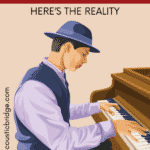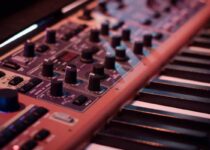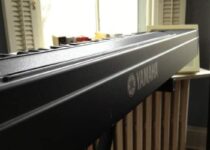How long does it take to learn the piano? It all depends on your goals and time that you put in. If you just to want to play piano for your own pleasure, you can expect positive results within three to five years. Obviously, getting to a level where you’re comfortable playing songs involves consistent practice sessions and study. How fast you learn depends on how much time you are willing to spend on your practice.
Does the amount of time you think it takes to learn piano put you off from ever getting started? When you ask yourself how long does it take to learn the piano, the answer is quite literally in your hands.
There is no hard and fast answer to how long it takes to learn piano. In this article, we’ll look at what you should consider when learning the piano, what can speed up the process, and what you should commit to when learning this fascinating instrument.
Post Contents
Firstly, There’s No Quick Fix!
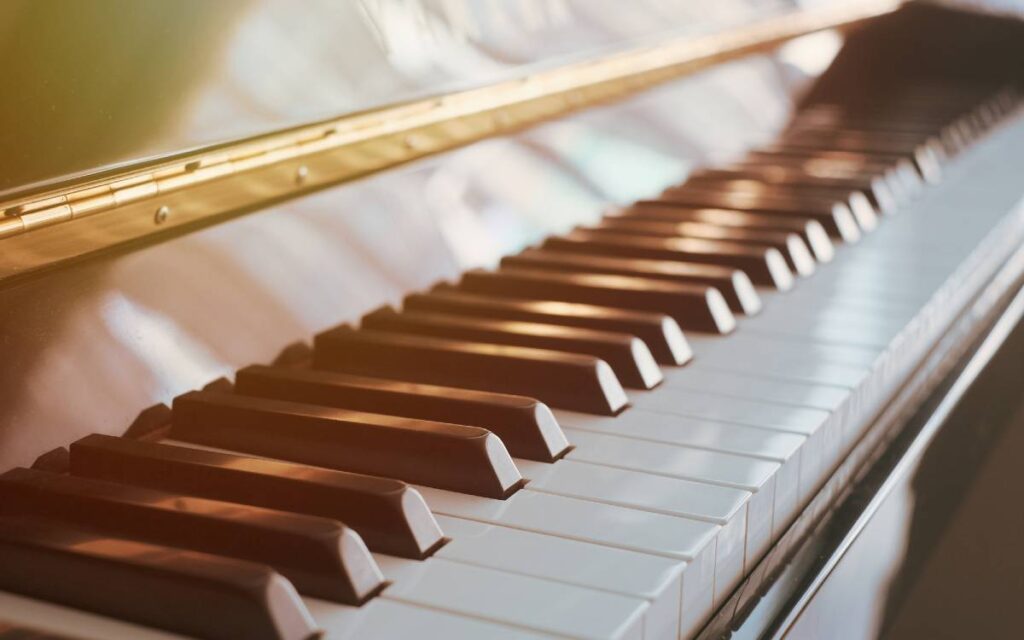
Yep, sorry about that. Sure, you can download apps that claim you’ll be playing your favorite songs on the piano in no time. But that is just one song, and it’s not really learning how to play piano.
If you want to sit down at a keyboard and bash out a couple of well-known tunes to impress your friends, then go for it. Find an app and replicate the hand positions. That’s all it is. It’s no magic trick.
Whereas when you genuinely learn to play piano, you will learn chords and scales and music notation, and… we could go on. Knowing all those things means that not only will you be able to play your favorite tunes, but you could also end up writing your own.
What to Consider When Learning Piano
So, how long does it take to learn piano? Let’s assume that you are a complete beginner and you have just started learning piano. If you practice the piano every day for between 30 minutes and one hour, you should be able to play a popular song within a year to 18 months.
That may sound like a long time, but that is going from a total beginner with no experience with playing. If you come to the piano already knowing some basic chords, and you understand how to read music, it may be quicker. One learner recorded their year of learning to play piano, and you can see the results below.
Be Patient
If you haven’t guessed already, it takes time, commitment, and patience to learn piano. You may come to it already able to read music or play a different instrument, which will help you when you start out playing the piano.
But if you are tackling the piano as a complete beginner, be under no illusion that it will take time. See your daily, weekly, or monthly progress as building blocks to something bigger. Time spent at the piano is never time wasted as you will move closer to your goals with every day that you play.
What Level Do You Want to Play?
Ask yourself why do you want to learn to play the piano? What are your goals?
Do you want to learn to play classical pieces? Play easy showtunes or TV themes on the piano? Improvise and jam with a band? Become a professional concert pianist?
Having an objective means that you can also measure how far you have come. If you have a burning desire to play Für Elise, it could take several years to reach that level. But if you want to play some simple versions of Coldplay tunes, you could achieve that within a year.
Whatever your goal, breaking it down into manageable steps can be vitally important to staying motivated.
How Do You Learn?
The type of learner you are will affect how long it takes you to learn how to play. Do you find it easy to focus and follow instructions? Or does your mind wander, and it takes several attempts to understand what you are supposed to do?
There’s nothing wrong with anyone’s learning technique. It’s just that some of us learn differently from others. Also, we hate to say it, but the older you are, the harder it can be to learn something new.
But don’t let that put you out. Learning the piano as an adult beginner does wonders for your brain.
Choose Your Instrument
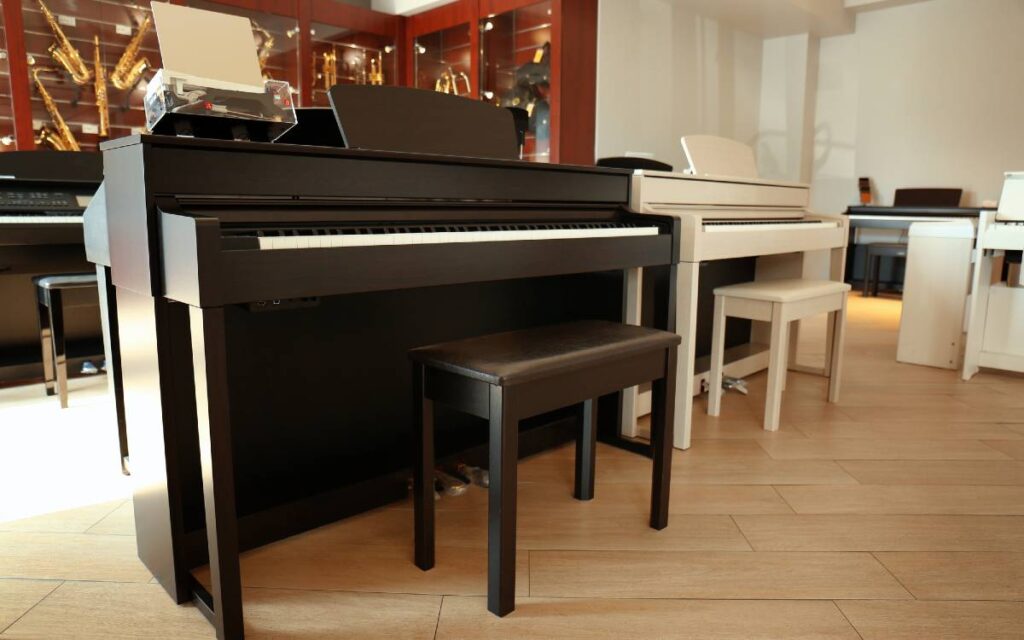
It goes without saying that piano students need a piano or a keyboard for practice. Here are some options among all the different piano types.
Traditional Piano
Probably the best for learning piano as you get a feel for a real keyboard. The bass keys are lower and heavier, and the treble or higher keys are lighter. Playing a traditional piano will build strength in your hands, encourage proper technique, and give you a feel for dynamics.
However, unless you are gifted one or can buy one second-hand, acoustic pianos are costly. They are also cumbersome, you need room in your home for it., and they must be tuned regularly.
Weighted Digital Piano
The next best thing is to buy a weighted keyboard, preferably one with hammer action keys. These types of keyboard feel the mot like a traditional piano. These piano keys have springs and a small weight attached to them that make them feel heavy.
They are also easy to transport and can be put away when not in use, although we recommend leaving it out to encourage practice.
Graded Hammer Action Digital Piano
The closest you will get to a traditional piano. They are heavier than the weighted keyboards and not as easy to transport. But as with a piano, you get a feel for heavier bass notes and lighter treble notes.
They can be pretty expensive, but if you are serious about learning to play, this is the best keyboard type after an acoustic piano.
Essential Skills That Will Help You Learn to Play Piano
There are several crucial things that you can do to help speed up your piano progression.
Learn to Read Sheet Music
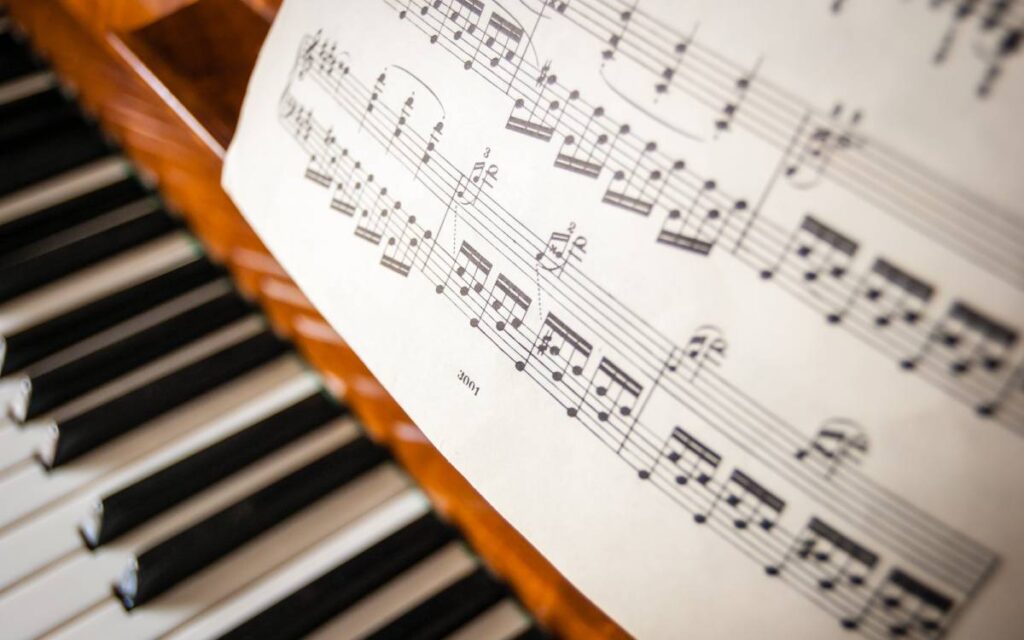
There is nothing to stop you from learning to play the piano by ear. After all, two of the most famous musicians in the world never learned to read music, and they produced some of the most beautiful songs. We’re talking about John Lennon and Paul McCartney.
In fact, did you know that none of the Beatles could read sheet music, and neither could Jimi Hendrix, Eric Clapton, or Slash?
But, they were all incredibly talented musicians who you could say were born with the ability to play music. Unfortunately, it’s quite a rarity just to be able to pick up an instrument and produce something incredible.
Imagine learning a language that you could speak fluently but couldn’t read. It’s the same with reading music. It shows you nuances and inflections in the music in the way that playing piano by ear doesn’t.
When it comes to reading music, put in the same focused practice that you do when playing piano. And if you are not fluent after a few months, don’t panic. It can take up to a year to learn to read music.
Remember to Warm Up
When you sit down at your practice session, an important factor is to do some warm-up exercises first. Exercises such as scales will not only warm your hands up but will help you as you progress onto more tricky techniques.
They also help to build up your finger strength. Playing the piano can be pretty hard work. A traditional piano has heavy keys that bounce back, and the lower the note, the heavier the key. Warm-up exercises will give you the strength in your hands and fingers to play all of the keys equally.
Perfect Your Piano Technique
Piano playing is as much about technique as it is about hitting the right notes on the piano. When you see a pianist leaning into the piano or dramatically throwing their hands into the air, they are not doing it for effect (ok, maybe some are), but they are doing it to make sure they strike the notes in a way that produces the right quality of sound.
A great example of this is the song “Feeling Good”. Watch and listen as the song moves from pianissimo (quiet) to Forte (loud) and how the pianist controls his hands and body as he creates the dynamics of the music.
Developing solid technique during your practice time will help prevent bad habits from creeping in.
Learn Piano Theory
Some musicians avoid piano theory altogether, but it’s the theory that will help you learn so much more about the piano.
A good tip is as you are learning music theory, apply it to the piano practically. It will make so much more sense if you learn your theory while sitting at the piano and not just reading it in a book.
If you are learning about chords, play the chords at the same time. See how they feel under your fingers. If you are learning your Circle of Fifths, find the sharps and flats on the keyboard. You’ll be surprised how quickly your learning will progress.
You Must Do Your Scales and Your Arpeggios
Yes, we know… practicing your scales is so dull! But they are the key (if you pardon the pun) to learning to play the piano.
So, if you do nothing else, do your best to practice your scales every day. Before you know it, you will be performing them with relative ease.
Start Simple
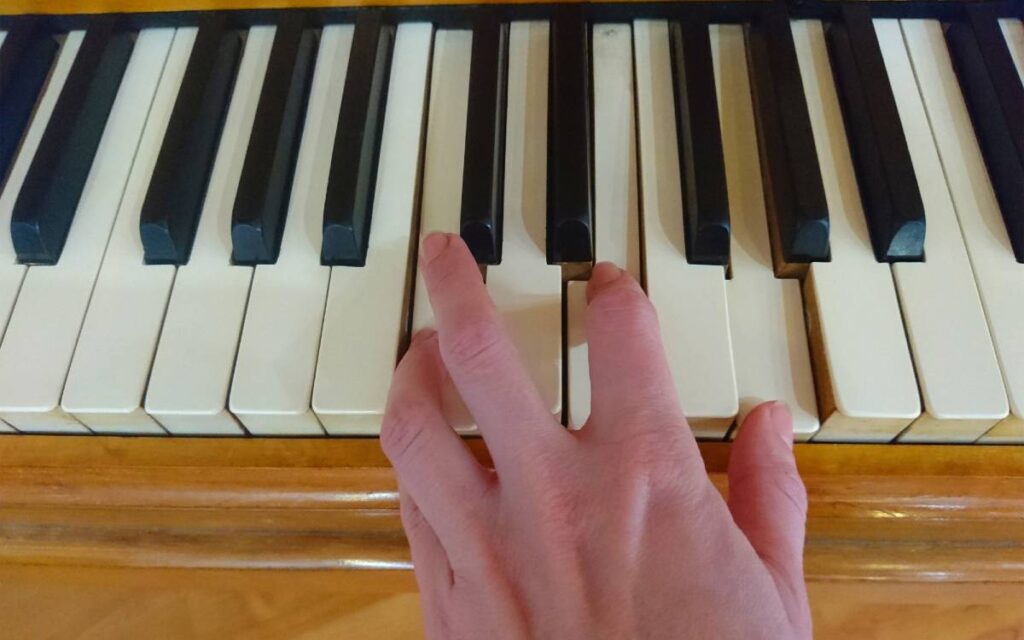
Don’t try and tackle anything too hard when you begin to learn. You will just feel despondent when you can’t play it and may want just to give it all up before you’ve started. Learning songs for your level will help you with confidence as you work your way up to the more complex pieces.
Taking Grades
Grades are an excellent way to measure how your piano playing is progressing. Although there is no official grading system in the USA, you can go through the internationally recognized ABRSM system.
In total, there are eight grades, and each grade progresses through a level of difficulty. You can take performance grades where you play four chosen pieces of music or a practical grade that assesses your playing, sight-reading, and technical and listening skills.
Grades are not for everyone, but they do give you something to aim for and give you a great sense of achievement when you pass.
Each grade takes one to two years to achieve, so if you use grades to measure how long it takes to learn to play the piano, you can be at a high level within 12 to 16 years. Now, do you see why concert pianists start learning when they are three years old!
Find Yourself a Great Piano Teacher
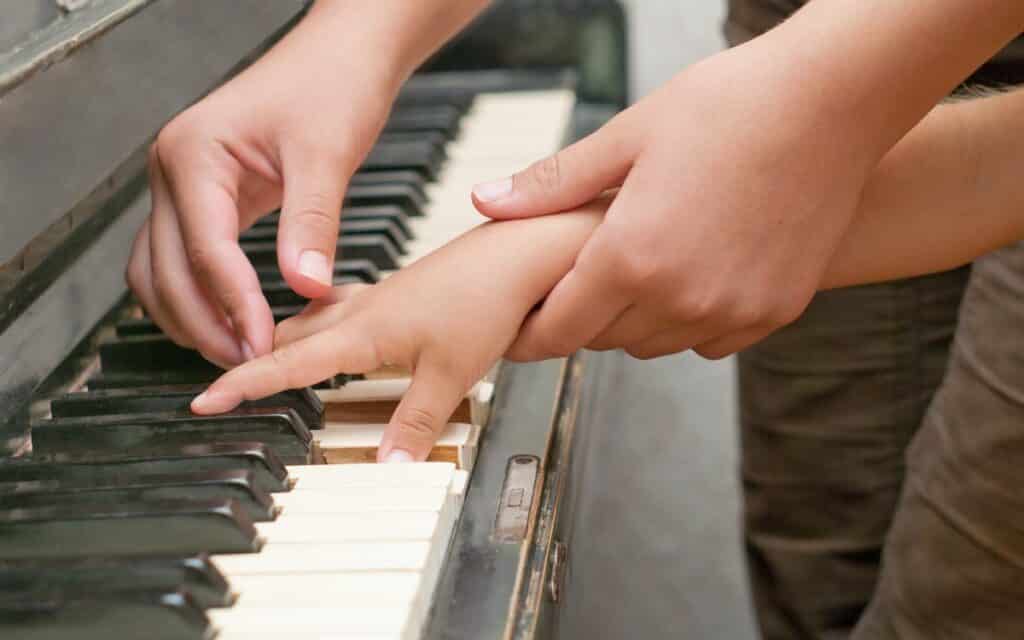
You remember how it was at school (or maybe you are still at school). If you had a teacher that inspired you and made learning fun, the chances are that you excelled at that subject. The same goes for learning the piano.
The right piano teacher will make all of the difference to your progression. But choose wisely. If you want to learn the blues or jazz piano, a classically trained piano teacher may not be the right one for you.
If you have no musical background and have never learned to play an instrument before, taking piano lessons with an experienced teacher is one way to accelerate you from beginner level to intermediate level.
If you haven’t considered taking piano lessons before, we would recommend it. Piano teachers can help you with your musical development, show you the proper technique, and assist you with music theory. You can even find teachers that excel at teaching adults piano lessons.
When you find the right piano teacher for you, try and stick with them. They will get to know you and support you through your learning process.
Practice, Practice, Practice!
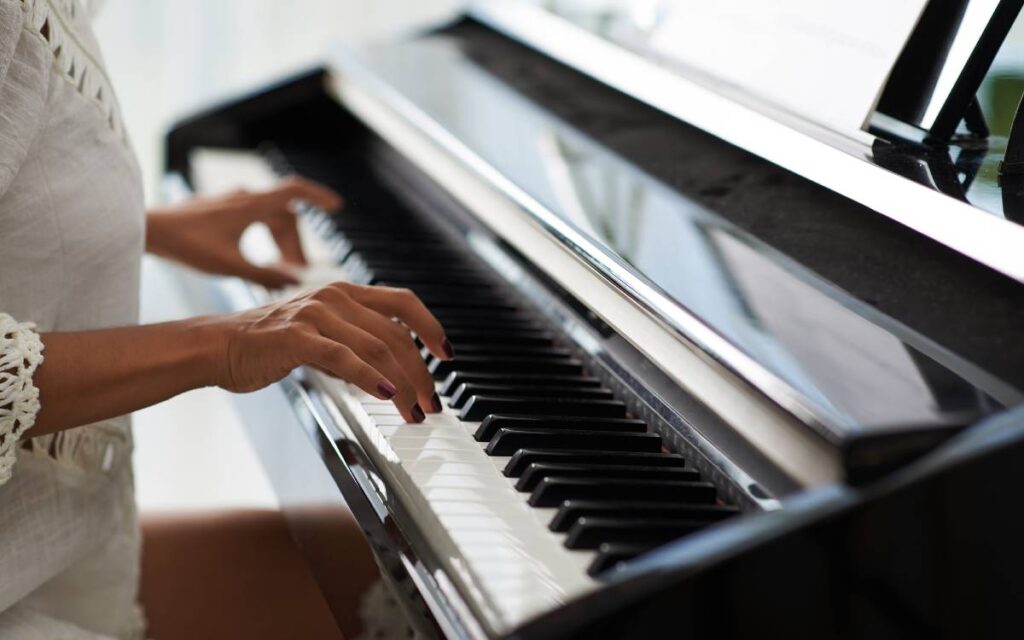
There’s no getting away from it. The only way to get really good at the piano is with dedicated practice. But make it fun, because you will struggle to progress if you dread your practice sessions.
Before you start your practice, take some time to sit and get into the right mindset. Try a few minutes of deep breathing or stretching before you start. Shake your hands to get them warmed up and get yourself properly ready for your piano practice.
When you practice piano, little and often can be just as worthwhile as spending hours practicing. Set yourself practice time frames. 10, 15, or 20 minutes at a time.
Use your daily practice time to go over some simple songs to begin with. Start with your left hand and then introduce your right hand. Use the time to read notes, play a simple song or go over some techniques.
With consistent practice you will get to an advanced level far quicker.
Record Your Piano Playing
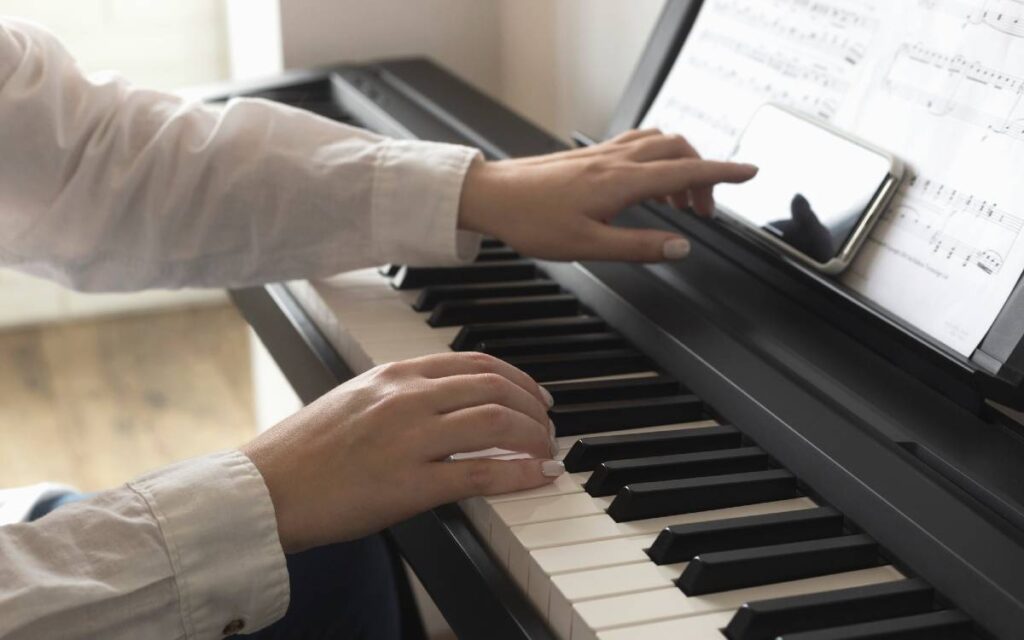
Get your smartphone out and record yourself playing. You could record yourself playing the same piece every week. After a few weeks, listen back to it and see how far you’ve progressed.
So, when you think that you are getting nowhere, you can effectively measure how far you have come.
Piano is a Lifelong Journey
The reality is, you never stop learning the piano. You don’t get to grade eight and shout out, “Hey, that’s it, there’s nothing more to learn!” You will always be learning something new for as long as you play the piano.
Even at the most advanced stage you will continue to enjoy playing. Your daily practice really will pay off in the long run and once you reach your desired level you’ll still spend many hours at the piano.
So how long does it take to learn piano? In the end that’s up to you, your goals, and your practice frequency.

